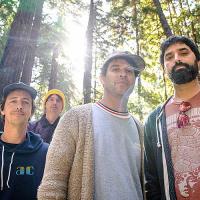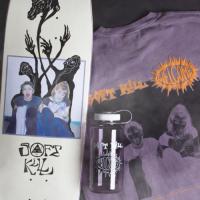Brujeria

Brujeria
"I pursued an interview with a bunch of masked dudes packing machetes"
By: Xander Dunlap | Photo: Pod
If you’re not familiar with the Mexican death metal band Brujeria, rumor has it that they’re narcotic-trafficking, Satanic, anti-Catholic revolutionaries. Whether or not this is true, Brujeria thrash in solidarity with indigenous Mexican struggles against the repressive Mexican government. They’ve been suspected of partaking in the narcotics industry, which is historically a trade that operates in impoverished and sanctioned communities as a means of survival.
Nonetheless, it’s a violent and bloody trade, probably due to clashes with CIA drug routes and competing cartels. The members of Brujeria cover their faces with ski-masks and bandanas at shows to avoid potential identification by state agencies looking into their previous “business transactions,” or maybe even unsolved murders. But suspected pastimes aside, Brujeria play with an intense, violent brutality that, with the right crowd, would probably result in politicians being hung from lamp posts.
As expected, the Portland show was fucking sick. Violent blast-beats, machetes, and suspected masked drug dealers singing in Spanish—what more could you ask for? After the show, drenched in sweat and slightly battered, I pursued an interview with a bunch of masked dudes packing machetes. Brujeria consists of an unknown number of mysterious rotating band members, but the aliases of the members who played tonight are El Brujo (vocals), Fantasma (vocals), Hongo (Guitar), El Cynico (Bass), and Podrido (Drums).
After reminiscing about skateboarding and how Black Flag, Code of Honor, Negative Approach, and other skate rock bands played a substantial role in Brujeria’s inspiration, Fantasma—who’s wearing a Black Label sweatshirt— admits that the song “La Migra” is based on lots of Black Flag beats and riffs. In fact, Fantasma’s first memorable skateboard was the Black Flag Skull Skates board. He had a Z-Flex in the late ’70s, too.
The song “Anti-Castro” has received a fair amount of criticism, considering the pro-Zapatista and revolutionary agenda within the band. However, according to Fantasma, who lived in Cuba a couple years after Castro’s rise to power, it soon became clear that the state of affairs was “more about the Soviets and less about dethroning a dictator.” In other words, the Cuban revolutionary regime was about pleasing the communist regime in Soviet Russia—and soon there was no room for dissent. “If there’s no freedom or room to grow, you can’t use your mind in a creatively,” he says.
Although Fantasma recognizes the current accomplishments in Cuba (high literacy rates, health care, higher education), and remains proud of his Cuban heritage, he stresses the danger of eliminating speech and the right to voice dissent. He draws a comparison between the social control mechanisms of anti-Americanism during the Castro regime and the way the United States uses the term “terrorism” to ignite fears—especially against Mexican immigrants—under the US Patriot Act.
He also remembers and misses Thrasher’s Puss Zone.
Being a gnarly band of suspected drug lords, I thought it fit to ask them about the drug and border violence occurring between the United Skates and Mexico, and how it affects the band.
“What gets through, gets through, good and bad,” says El Brujo. “It’s all the same for us. Everyone is in on it, even the police. Everyone is worked in and gets paid off.”
This led to a series of stories about run-ins with border patrols, los Federales, and the Mexican military—throwing joints out the window at surprise check-points, then getting let off by Texas agents in exchange for autographs. One time, a soldier at the border fanned out on the band and shouted, “Matando Gueros!” It seems like anyone else would have a nervous breakdown at these check-points, but El Brujo and the others laugh when they tell me about how the police treat the band: “Cops bring us weed when they find out we’re in Mexico,” he says. “You know, a couple pounds with seeds and trimmings. They had probably just confiscated it.”
-
4/26/2024
Skegss Interview
Australia's Skegss are the reverb drenched summer soundtrack you need. Read the exclusive Thrasher interview. -
4/26/2024
Beirut Interview
The music of Beirut has been featured in many skate vids over the years, most notably in Mark Suciu’s “Verso” masterpiece. Mark caught up with Zach Condon, the man behind the band, in this exclusive interview. -
4/26/2024
Tom DeLonge Interview
Angels & Airwaves was born out of Tom DeLonge leaving Blink-182. Here he talks about charting that band’s own path along with his thoughts on skating and UFOs. -
4/26/2024
Greta Van Fleet Interview
Using musical chemistry, the band members of Greta Van Fleet extract the essence of various classic rock anthems. They combine the parts they like and create a sound all their own. These guys truly rock and roll. -
4/26/2024
Mononeon Interview
The term "musical prodigy" doesn't quite capture the bass-playing abilities of Mononeon. It's more accurate to say he's one of the best to ever pick up the instrument. See for yourself. -
4/26/2024
Animal Collective Interview
Animal Collective blew up in the skate world when their song was used in Jake Johnson's Mind Field part—which is regarded as a masterpiece of skating/editing/music. The band's unique legacy and sound has only gotten stronger in the following years. -
4/26/2024
Thurston Moore's Interview
Thurston is a founding member of Sonic Youth and a guitar virtuoso. His various projects have created a rich musical legacy. He also has deep roots with skating and video-making. Here he describes the mutual affection between skating and his music. -
4/26/2024
Soft Kill x Welcome Skateboards
Welcome gets the singer from Soft Kill on the line to discuss music, addiction and their recent collaboration. -
4/26/2024
R.A. the Rugged Man Interview
During his 30-year career, R.A. has occupied both the spotlight and the status of an underground hip-hop legend. His song "Uncommon Valor" is regarded as a lyrcial masterpiece and he shows no signs of stopping. -
4/26/2024
Third Eye Blind Interview
After millions of album sales since the mid-90s, Third Eye Blind frontman Stephan Jenkins continues to make music without compromise or concern about radio hits and pop charts. He features Cher Strauberry in his newest video and she sat with him for an interview.









